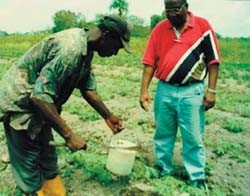
Bacchus lives on the east bank of Guyana’s Demerara River, thirty miles from the capital of Georgetown. He takes his sweet cassava and sweet potatoes to his farm gate and unloads his harvest to a buyer. It was hard to get by. He did not have any impact on prices despite efforts to improve quality. He constantly fought to make a reasonable living.
Bacchus and the rest of the members of the Friendship Farmers Land Cooperative Society reach their farms in canoes and public buses. They grow tasty varieties of sweet cassava along with sweet potatoes which have a good demand from consumers in Georgetown. The Friendship farmers know they have a good product, but are receiving prices below what they could earn if they had a better production and selling strategy.
As a solution, they enthusiastically pursued participation in USAID’s Farmer to Farmer program administerd by Partners of the Americas as a means toward improving their farm operations. Through the program, U.S. agricultural volunteers work directly with local counterparts to address identified needs and share their knowledge to help increase farm production and farmer incomes while preserving the natural resource base. Dr. James Garner, Director of the Department of Agriculture at the University of Arkansas at Pine Bluff, traveled to Guyana sixteen times to work on improving sweet potato and cassava production practices.
USAID’s Farmer to Farmer program provides assistance to local agricultural producers, producer organizations, and agribusinesses, as well as groups who historically have had little access to these resources such as women, farmers from remote regions, and producers of non-traditional crops. The program works with small farmers to implement sustainable, environmentally sound agricultural practices and to improve their income and nutrition.
Garner demonstrated to farmers the importance of fertilizer, fungicides and pest control, all of which were never previously implemented. Local varieties of the root crops were selected and new plants introduced from Mississippi, with a particular emphasis on selecting drought-resistant varieties. His guidance has resulted in marked improvements in the production levels of both cassava and sweet potatoes.
Based on Garner’s help, the Friendship farmers such as Bacchus have improved their product quality and tailored their product to the needs and preferences of their market. As a result, they are taking steps to gain name recognition for their Cassava. Cassava production increased from 3000 lbs/acre to 5000 lbs/acre - a 60% increase. In addition, sweet potatoes increased from 4000 lbs/acre to 7000 lbs/acre - an 80% increase.
Moreover, they are gaining further control over their future by moving toward marketing as a cooperative, instead of selling individually to intermediaries who pay lower prices. The farmers are beginning to see that they can make significant progress together, where they were previously hindered working alone.







Comment
Make a general inquiry or suggest an improvement.